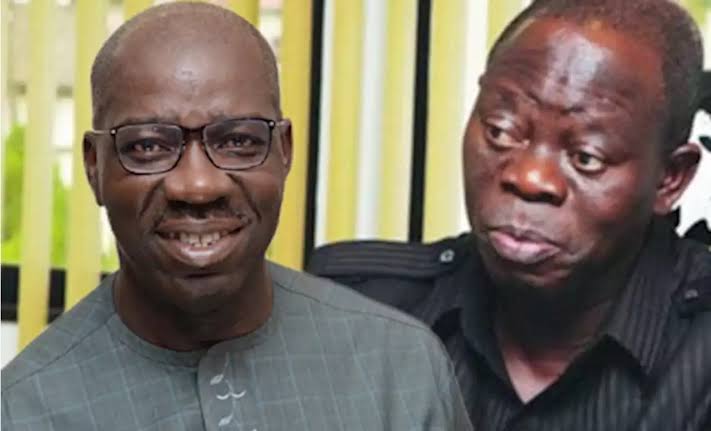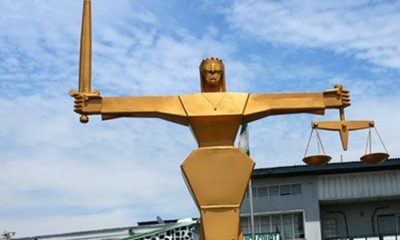Opinion
Edo State Power Versus National Government Authority, How Will It End?

By John Egbeazien Oshodi
The deeply polarized and highly partisan tone of the recent politics in Edo State due to petty partisan squabbling for power harms the Edo people and voters.
This remains troubling for a land that is historically, traditionally and characteristically known for the beliefs and sentiments of respect, reverence, peace, and happiness.
The long-simmering Oshiomhole-Obaseki feud followed by the long-running battle pitting in fights within the one-part system that now dominates the State legislature generally named the House of Assembly is awfully affecting the entire Edo State.
The ruling All Progressive Congress national chairman, Adams Oshiomhole, is the gubernatorial predecessor of the current Edo State Governor, Godwin Obaseki, and both remain openly paranoid of each other currently.
From the point of human psychology, these opponents are at war over the domination of the State affairs, the legislature especially. This political and personal intensity sits like a huge block on the head of the people and developments.
If the media is correct, the current Governor, and his followers see the former Governor as a man of permanent dictatorship, while the former Governor now at the helm of the majority Party in Nigeria along with his associates apparently views the current Governor as permanently disloyal in responsiveness or personal obligations to the person of the former Governor. This type of visible and invisible deal is not only misleading for the Edo voters but that is not how democracy works.
If this type of infected partisanship inside the APC State leadership continues it could destroy democratic developments as these battles could potentially result into various forms of political vengeance, individual retribution, and institutional disagreements with each camp accusing each other of good versus evil.
The political distrust between the two good men partly stems from apparent difference in psychological and developmental backgrounds.
On a personal level Adams Oshiomhole, is a man with some level of moderate education from Britain, and with vast skills in the world of labor unionism, labor negotiations, grassroots organizing and collective bargaining, who came into the political environment with apparent marks of authority and publicity.
Godwin Obaseki on the other hand, presents as a man fully dressed and highly schooled in classics, philosophy, and literature topped with advanced Business degree from the United States of America where he also experienced the Corporate world. As a part of his corporate culture, he brings into the government acts of commitment, transparency, open attitude, need for work results, and approaches governance from the lens of non-rhetoric, non-fanfare, and he is all about the business of governance and responsibility to the voters first.
Under these clear and distinct differences, it is no shock that while Oshiomhole reportedly personally picked Obaseki to succeed him as odd as it sounds in terms democratic equity, he expects full loyalty apparently. But Obaseki, who is fully aware of how he came into the Edo political scene does not feel he must serve the personal interest of any individual. So, this bizarre dynamics between both continues and has deeply spilled into every part of government including the Edo House of Assembly.
There used to be a time when the monarch like the Oba of Benin, Omo N’Oba N’ Edo, Ewuare II, could assert his traditional and principal leadership to handsomely maintain peace among his citizens like the two warring leaders but not this time as no one wants to listen, as such, King Ewuare II, recently met and told President Muhammadu Buhari to quickly intervene in the ongoing dispute.
In the same vein, the art of bipartisanship is currently lost in the Edo House of Assembly where the entire 24 members are of the party of All Progressive Congress (APC). Currently, a one-party system dominating the Edo legislature gives the perception of silencing of the opposition party who represents the position of other Edo citizens under the opposition party, People’s Democratic Party (PDP).
As such, the one-party domination in the House of Assembly could be viewed as not ensuring accountability, representation, transparency, equity, and inclusiveness. One party domination is also known to encourage political individuality, extremism, anti-diverse ideas and anti- broad-based participation.
On top of these complications is the APC waging a war against its very self. A political monopoly that has become problematic for the people and economy.
Oshiomhole asserts that only nine out of the 24 members-elect who were all elected under APC got inaugurated at night, and he sees the current installed speaker as an illegal Speaker because the rule of law did not prevail, and he declared that the minority who was inaugurated is a bunch of loyalists of Obaseki.
Oshiomhole states that since the ruling party (APC) believes in the rule of law and democratic principles, Obaseki needs to issue a new proclamation letter for the “proper” inauguration of the Edo State House of Assembly and the election of a new Speaker; missing this request, the leadership of the National Assembly, the Inspector General of Police (IGP) and Director-General (DG) of the Department of State Services could see the Edo matter as a national security risk as evidenced by their reported recent visit to Edo State Governor.
Obaseki, on the other hand, sees the Edo 7th House of Assembly as properly instituted and asserts that how the new Speaker was installed is in order, and sees the entire installation as a fair play. He believes that the way the current inauguration took place could reduce the present crisis which is reportedly being brought into the State by his predecessor, thereby allowing him to fully govern the State politically and economically in a much more uninterrupted manner.
To further complicate this chaos, could Obaseki be thinking that should Oshiomhole have his way to a fresh inauguration, impeachment proceeding against him could commence.
The Nigerian democracy, like all political systems, must rests on norms, and the only way our young democracy can be saved, is the believe that rules can only save us if they are agreed upon and fully respected; and a fair and independent judiciary which is the cornerstone of our democratic system is our only hope. Let’s wait and see how all this end.
George Washington America’s first President in his farewell address on September 19, 1796 once predicted that political partisanship would lead to democratic instability: “The alternate domination of one faction over another, sharpened by the spirit of revenge, natural to party dissension, which in different ages and countries has perpetrated the most horrid enormities”.
Let’s learn from this universal history as we experiment with democratic test all over Africa, including Edo State, Nigeria.
John Egbeazien Oshodi, Ph.D. is a Florida based Forensic/Legal Psychologist. He can be reached via email: Jos5930458@aol.com












